人教版(2019)必修 第二册Unit 4 History and Traditions Assessing Your Progress and Project课件(共14张PPT)
文档属性
| 名称 | 人教版(2019)必修 第二册Unit 4 History and Traditions Assessing Your Progress and Project课件(共14张PPT) |
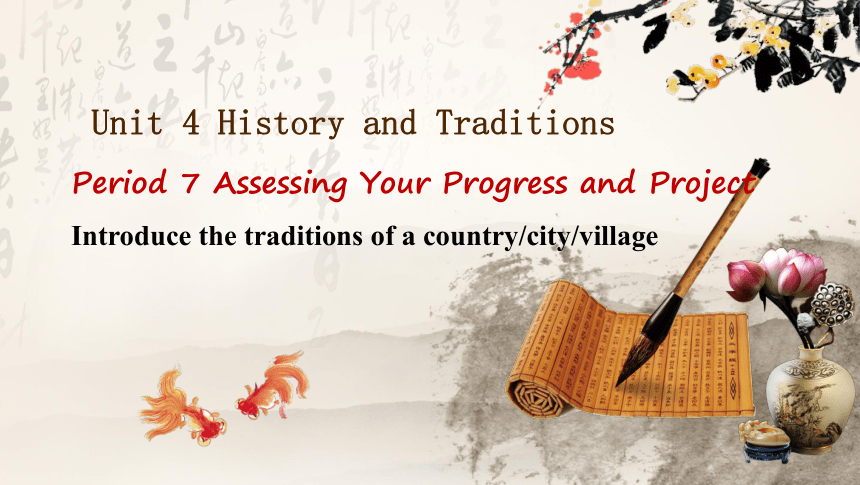
|
|
| 格式 | pptx | ||
| 文件大小 | 3.4MB | ||
| 资源类型 | 教案 | ||
| 版本资源 | 人教版(2019) | ||
| 科目 | 英语 | ||
| 更新时间 | 2024-04-20 00:00:00 | ||
图片预览

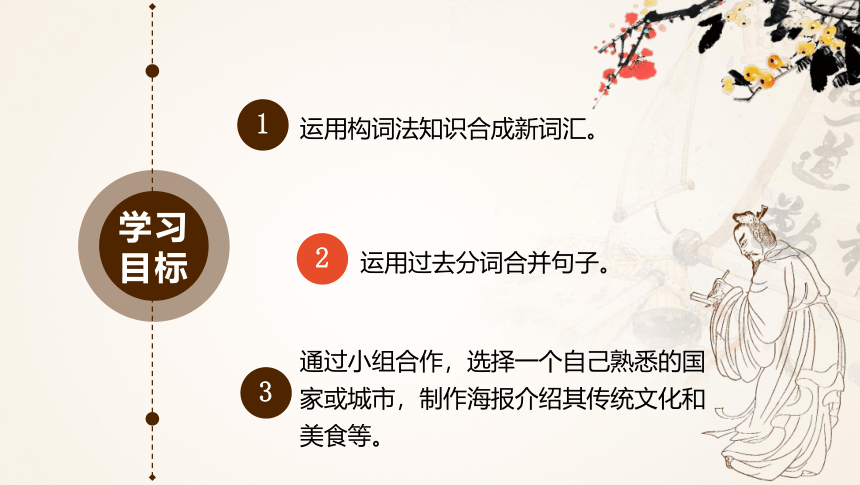
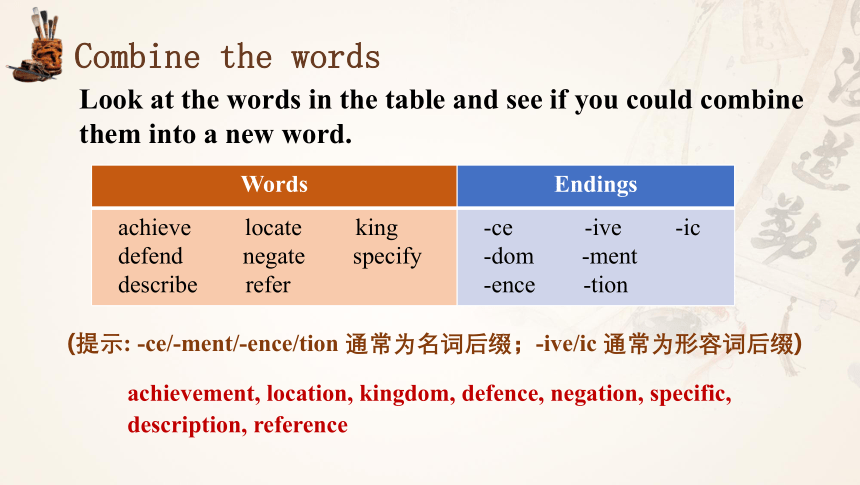
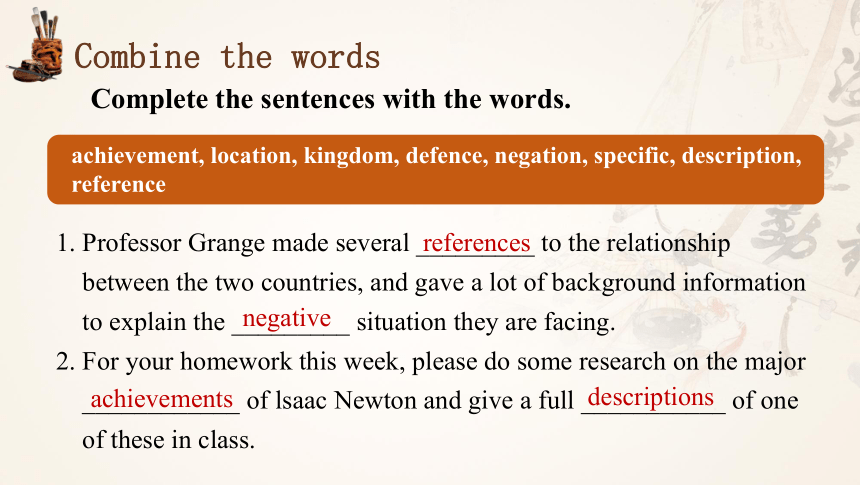
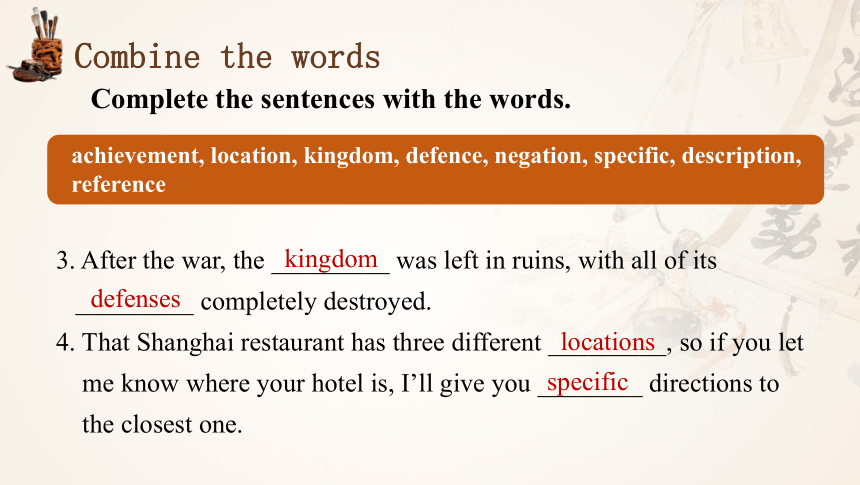
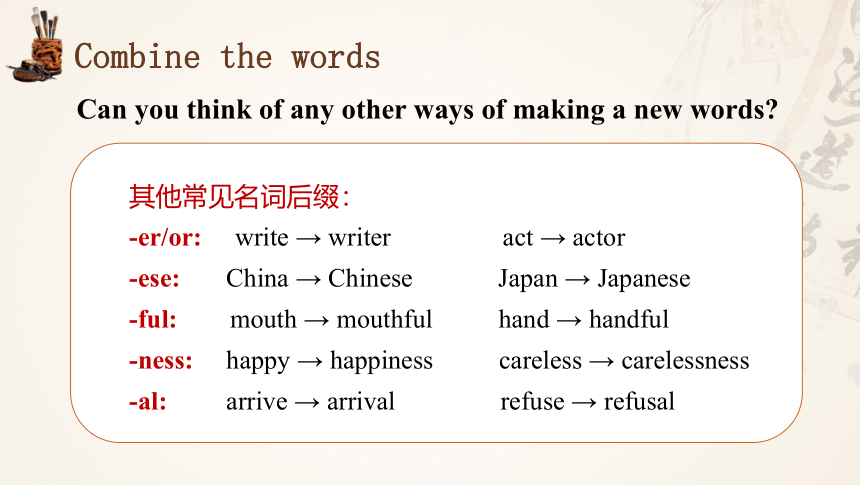
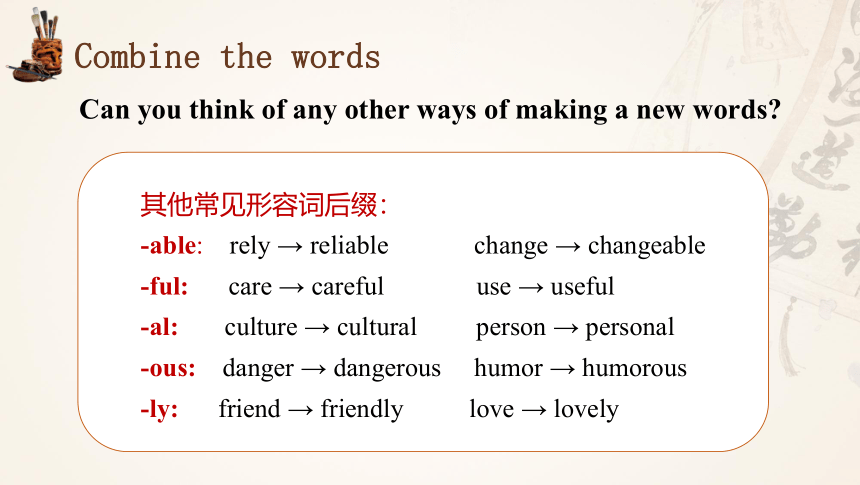
文档简介
(共14张PPT)
Unit 4 History and Traditions
Period 7 Assessing Your Progress and Project
Introduce the traditions of a country/city/village
学习
目标
1
运用构词法知识合成新词汇。
2
运用过去分词合并句子。
3
通过小组合作,选择一个自己熟悉的国家或城市,制作海报介绍其传统文化和美食等。
Combine the words
Look at the words in the table and see if you could combine
them into a new word.
(提示: -ce/-ment/-ence/tion 通常为名词后缀;-ive/ic 通常为形容词后缀)
Words Endings
achieve locate king defend negate specify describe refer -ce -ive -ic
-dom -ment
-ence -tion
achievement, location, kingdom, defence, negation, specific, description, reference
Combine the words
Complete the sentences with the words.
achievement, location, kingdom, defence, negation, specific, description, reference
1. Professor Grange made several _________ to the relationship
between the two countries, and gave a lot of background information
to explain the _________ situation they are facing.
2. For your homework this week, please do some research on the major
____________ of lsaac Newton and give a full ___________ of one
of these in class.
references
negative
achievements
descriptions
Combine the words
Complete the sentences with the words.
achievement, location, kingdom, defence, negation, specific, description, reference
3. After the war, the _________ was left in ruins, with all of its
_________ completely destroyed.
4. That Shanghai restaurant has three different _________, so if you let
me know where your hotel is, I’ll give you ________ directions to
the closest one.
kingdom
defenses
locations
specific
Combine the words
Can you think of any other ways of making a new words
其他常见名词后缀:
-er/or: write → writer act → actor
-ese: China → Chinese Japan → Japanese
-ful: mouth → mouthful hand → handful
-ness: happy → happiness careless → carelessness
-al: arrive → arrival refuse → refusal
Combine the words
Can you think of any other ways of making a new words
其他常见形容词后缀:
-able: rely → reliable change → changeable
-ful: care → careful use → useful
-al: culture → cultural person → personal
-ous: danger → dangerous humor → humorous
-ly: friend → friendly love → lovely
Combine the words
Combine each pair of sentences into one using the past participle
of the verb in the second sentence.
1. I heard the trip was to visit our sister school in Boston. That excited me.
2. I heard you had been chosen to join a cultural camp in Greece.
That pleased me.
3. Dave could not find a seat in the room. It was very crowded.
I was excited to hear the trip was to visit our sister school in Boston.
I was pleased to hear you had been chosen to join a cultural camp in Greece.
Dave could not find a seat in the very crowded room.
Combine the words
Combine each pair of sentences into one using the past participle
of the verb in the second sentence.
4. The photo won the first prize in the competition. It was taken at
Cardiff Castle.
5. On the lab table, he found a lot of bottles. They were marked
“caution”.
The photo taken at Cardiff Castle won the first prize in the competition.
On the lab table, he found a lot of bottles marked “caution”.
Project: Introduce the traditions of a
country/city/village
Look at the posters about Mexico and tell us what has been introduced about Mexico and why those aspects are important.
The posters show us the food and drink, dances and music, clothing and activities in Mexico. It is very important to know those aspects if you want to know a country well.
Project: Introduce the traditions of a
country/city/village
Work in groups. Make a poster about a country, a city or a village.
Attention:
Divide work among your group members. Some should research traditions, providing photos and detailed descriptions. The others can create the poster.
Project: Introduce the traditions of a
country/city/village
Present your poster to the class.
Try to answer any questions asked.
Assignment
You may surf the Internet and add more information to your poster after class.
Unit 4 History and Traditions
Period 7 Assessing Your Progress and Project
Introduce the traditions of a country/city/village
学习
目标
1
运用构词法知识合成新词汇。
2
运用过去分词合并句子。
3
通过小组合作,选择一个自己熟悉的国家或城市,制作海报介绍其传统文化和美食等。
Combine the words
Look at the words in the table and see if you could combine
them into a new word.
(提示: -ce/-ment/-ence/tion 通常为名词后缀;-ive/ic 通常为形容词后缀)
Words Endings
achieve locate king defend negate specify describe refer -ce -ive -ic
-dom -ment
-ence -tion
achievement, location, kingdom, defence, negation, specific, description, reference
Combine the words
Complete the sentences with the words.
achievement, location, kingdom, defence, negation, specific, description, reference
1. Professor Grange made several _________ to the relationship
between the two countries, and gave a lot of background information
to explain the _________ situation they are facing.
2. For your homework this week, please do some research on the major
____________ of lsaac Newton and give a full ___________ of one
of these in class.
references
negative
achievements
descriptions
Combine the words
Complete the sentences with the words.
achievement, location, kingdom, defence, negation, specific, description, reference
3. After the war, the _________ was left in ruins, with all of its
_________ completely destroyed.
4. That Shanghai restaurant has three different _________, so if you let
me know where your hotel is, I’ll give you ________ directions to
the closest one.
kingdom
defenses
locations
specific
Combine the words
Can you think of any other ways of making a new words
其他常见名词后缀:
-er/or: write → writer act → actor
-ese: China → Chinese Japan → Japanese
-ful: mouth → mouthful hand → handful
-ness: happy → happiness careless → carelessness
-al: arrive → arrival refuse → refusal
Combine the words
Can you think of any other ways of making a new words
其他常见形容词后缀:
-able: rely → reliable change → changeable
-ful: care → careful use → useful
-al: culture → cultural person → personal
-ous: danger → dangerous humor → humorous
-ly: friend → friendly love → lovely
Combine the words
Combine each pair of sentences into one using the past participle
of the verb in the second sentence.
1. I heard the trip was to visit our sister school in Boston. That excited me.
2. I heard you had been chosen to join a cultural camp in Greece.
That pleased me.
3. Dave could not find a seat in the room. It was very crowded.
I was excited to hear the trip was to visit our sister school in Boston.
I was pleased to hear you had been chosen to join a cultural camp in Greece.
Dave could not find a seat in the very crowded room.
Combine the words
Combine each pair of sentences into one using the past participle
of the verb in the second sentence.
4. The photo won the first prize in the competition. It was taken at
Cardiff Castle.
5. On the lab table, he found a lot of bottles. They were marked
“caution”.
The photo taken at Cardiff Castle won the first prize in the competition.
On the lab table, he found a lot of bottles marked “caution”.
Project: Introduce the traditions of a
country/city/village
Look at the posters about Mexico and tell us what has been introduced about Mexico and why those aspects are important.
The posters show us the food and drink, dances and music, clothing and activities in Mexico. It is very important to know those aspects if you want to know a country well.
Project: Introduce the traditions of a
country/city/village
Work in groups. Make a poster about a country, a city or a village.
Attention:
Divide work among your group members. Some should research traditions, providing photos and detailed descriptions. The others can create the poster.
Project: Introduce the traditions of a
country/city/village
Present your poster to the class.
Try to answer any questions asked.
Assignment
You may surf the Internet and add more information to your poster after class.
